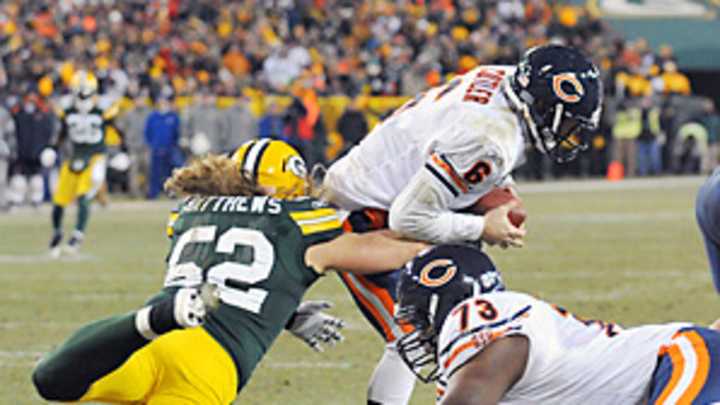Playoff Breakdown: Packers-Bears

Breaking down the NFC Championship Game, Packers at Bears, Sunday, 3 p.m., FOX:
1. The Packers' pressure on Jay Cutler. Cutler can be lethally good when he's on his game; witness his 22-0 record when his passer rating exceeds 100, including the postseason. However, the former Vanderbilt star can be incredibly bad when flustered in the pocket; witness his nine interceptions in his last four games against Green Bay. The Packers sacked him six times in this season's regular-season finale (a 10-3 Packer win) -- which contributed to two interceptions deep in Green Bay territory -- and sacked him multiple times in each of the four games since he was traded from Denver to Chicago before the 2009 season.
With solid protection last week against Seattle, Cutler threw for two scores and ran for two others. It was only the sixth time in 17 games this year (including the postseason) he finished a game without a pick. He'll need to be as good with his accuracy as his decision-making against the Packers, whose 24 interceptions ranked second in the league. Another thing to keep in mind: Green Bay had multiple picks in three of its last four games against Cutler. The one time it didn't was the only time it lost.
2. The Bears' tackling. Green Bay ranked fifth in the league with 4,129 yards passing, 523 more than any remaining playoff team. Forty-nine percent of the yards came after the catch, which is why the Bears need to be sure with their tackling. Greg Jennings was fifth among wide receivers with 436 yards after the catch, and James Jones had 304. Only 12 teams had a higher yards-after-the-catch percentage than the Packers, who've been equally productive in the playoffs, gaining 277 of their 546 passing yards (51 percent) after the catch.
Chicago also must limit Aaron Rodgers' ability to escape the pocket. Atlanta had at least six chances for sacks last Saturday but failed to bring down Rodgers, who spun out of trouble, moved in the pocket, or scrambled free. After the first few times, the dejection from those missed opportunities was readily apparent on the Falcons' faces.
3. Mike Martz's commitment to the run. The Bears' offense found its rhythm in the middle of the season, when coordinator Mike Martz began leaning on the running game. Chicago averaged 22.3 rushes in its first seven games and 30.3 in its last 10, including the playoffs. The change is reflected in Matt Forte's statistics. He ran for more than 90 yards in five of the last seven games during the regular season, after doing it just once in the first nine. The Packers were vulnerable against the run at times, allowing an average of 4.7 yards a carry. In fact, Forte averaged 6.1 at Lambeau Field in Week 17.
It's imperative the Bears avoid third-and-long situations because Packers defensive coordinator Dom Capers is so creative with play-calling. Against Green Bay and its 3-4 defense, opponents had the league's fourth-worst passer rating (67.29) in blitzing situations and threw eight interceptions. Only two teams had more picks in blitzing situations.
In three career playoff starts, Rodgers has thrown 10 touchdowns and only one interception. He has completed 77.3 percent of his passes and improved his passer rating each outing from 121.4 against Arizona last season to 122.5 against Philadelphia and 136.8 against Atlanta this postseason.
Yet ...
Arguably no defense has given him more problems than Chicago's. The Bears have limited him to just three touchdowns (with two interceptions) in the teams' last four meetings. In those games he was sacked four, three, zero and two times. One reason is that Chicago can drop more defenders into coverage because it's able to generate a pass rush with its front four. That will be critical Sunday, because Rodgers was the league's best passer against the blitz this year among quarterbacks with at least 100 attempts in those situations. He completed 111-of-167 passes, according to Stats Inc., with 11 touchdowns, five interceptions and a 104.5 rating.
The teams' last five meetings have been decided by a touchdown or less, and this one should be no exception. Part of it has to do with the clubs being so familiar with each other as NFC North rivals; another factor could be the natural "turf" in Soldier Field, which some players rank among the worst in the league. Packers 17, Bears 13

Senior Writer, Sports Illustrated Followers of the NFL have long relied on Jim Trotter for his dogged reporting and astute insights. Trotter joined Sports Illustrated as a senior writer in September 2007. Before that he spent nearly 18 years at the San Diego Union-Tribune, where he climbed the ladder from preps reporter to lead NFL writer. He spent nine years covering the San Diego Chargers, who did not have a winning record or reach the playoffs in his first eight years on the beat. The team finally ended the drought in 2004, after which Trotter began covering the league at large. Trotter cites three stories as the most memorable of his SI career: a 2007 piece on the death of Sean Taylor because, "It allowed us to examine his life beyond the stereotypes that had been attached to him"; a 2011 feature on Tim Tebow and the Broncos, whose run to the playoffs was nearly as indescribable as it was improbable; and a 2012 piece on the remaking of the Raiders following the death of longtime patriarch Al Davis. Born in San Francisco, Trotter graduated from Howard University in 1986 with a degree in communications and is a member of the Pro Football Hall of Fame selection committee. In addition to his SI duties, Trotter has made appearances on numerous national media outlets, including CNN, Fox News, ESPN, NFL Network, and The Jim Rome Show. He also has been a guest on radio shows across the country. Trotter resides in San Diego.